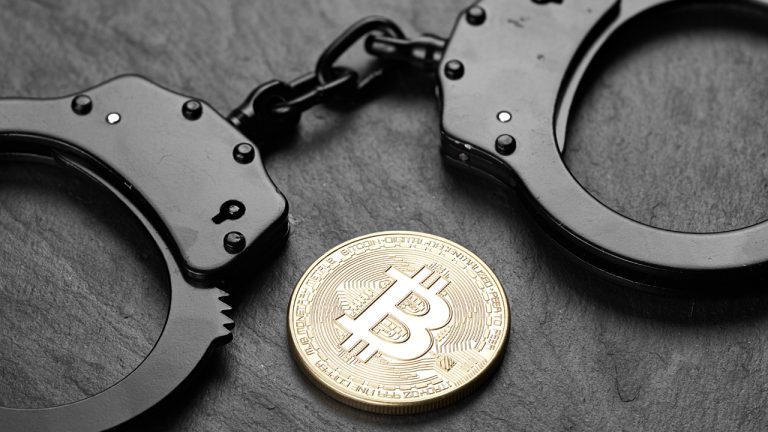
A hacker once in possession of 50,000 Bitcoin (BTC) stolen from the internet marketplace Silk Road is being sentenced to federal prison. In a new press release, the U.S. Department of Justice (DOJ) says that James Zhong has been sentenced to one year and one day in prison for stealing about 50,000 BTC from Silk […]
The post Silk Road Hacker Who Once Held Over $3,000,000,000 in BTC Sentenced to Prison by Feds 11 Years Later appeared first on The Daily Hodl.
 On April 14, 2023, the Department of Justice (DOJ) for the Southern District of New York revealed that the hacker responsible for the Silk Road marketplace breach had been sentenced to a year in prison for wire fraud charges. James Zhong stole more than 50,000 bitcoin from the darknet marketplace (DNM) in September 2012. DOJ […]
On April 14, 2023, the Department of Justice (DOJ) for the Southern District of New York revealed that the hacker responsible for the Silk Road marketplace breach had been sentenced to a year in prison for wire fraud charges. James Zhong stole more than 50,000 bitcoin from the darknet marketplace (DNM) in September 2012. DOJ […]
James Zhong pleaded guilty to the wire fraud charges in November 2022 and had been awaiting sentencing for his role in the "unlawfully obtained" Bitcoin scheme.
The United States Attorney’s Office for the Southern District of New York has announced the sentencing for an individual who pleaded guilty to wire fraud charges connected to “unlawfully obtained” Bitcoin from the Silk Road marketplace in 2012.
In an April 14 announcement, the U.S. Justice Department said James Zhong was sentenced to one year and one day in prison for charges related to executing a scheme to steal more than 51,680 Bitcoin (BTC). Zhong pleaded guilty to the charges in November 2022 and had been awaiting sentencing.
“Cyber-criminals should heed this message: we will follow the money and hold you accountable, no matter how sophisticated your scheme and no matter how long it takes,” said U.S. Attorney Damian Williams.
According to Williams, Zhong stole the BTC in 2012 and managed to conceal his crime for roughly 10 years before facing charges. U.S. authorities seized the Bitcoin holdings from Zhong’s home in the state of Georgia in November 2021, finding the bulk of the crypto in a floor safe and a computer concealed in a popcorn tin. The coins were worth roughly $3.4 billion at the time.
In the U.S. Attorney's sentencing memo for Silk Road Bitcoin stealer James Zhong: investigators seized criminal proceeds from "a single-board computer that was submerged under blankets in a popcorn tin stored in a bathroom closet." (Sentencing is today at 3 pm). pic.twitter.com/7aamQryQ6B
— Rachel Scharf (@rscharf_) April 14, 2023
Related: US government plans to sell 41K Bitcoin connected to Silk Road
The Silk Road marketplace, defunct for roughly 10 years, allowed users to buy and sell illicit goods such as weapons and stolen credit card information, drawing the attention of U.S. authorities. The creator of the platform, Ross Ulbricht, was arrested for his role in 2013 and is currently serving two life sentences without the possibility of parole.
Magazine: US enforcement agencies are turning up the heat on crypto-related crime
 According to a court document filed on March 31, 2023, regarding the sentencing of James Zhong, who stole over 50,000 bitcoin from the Silk Road marketplace, the U.S. government plans to liquidate 41,490 bitcoin “over the course of this calendar year.” U.S. Government Discloses Strategy for Selling Confiscated Bitcoin The U.S. government, one of the […]
According to a court document filed on March 31, 2023, regarding the sentencing of James Zhong, who stole over 50,000 bitcoin from the Silk Road marketplace, the U.S. government plans to liquidate 41,490 bitcoin “over the course of this calendar year.” U.S. Government Discloses Strategy for Selling Confiscated Bitcoin The U.S. government, one of the […]
On March 14, 2023, the government sold 9,861 BTC for $215.7 million, according to court documents filed on March 31.
The United States government plans to liquidate more than 41,000 Bitcoin seized as part of the case against Silk Road creator Ross Ulbricht.
A March 31 filing with U.S. District Court for the Southern District of New York regarding the case against James Zhong said U.S. government authorities had begun liquidating roughly 51,352 Bitcoin (BTC) seized in the Ulbricht case. According to the filing, officials sold roughly 9,861 BTC for more than $215 million on March 14, leaving roughly 41,491 BTC.
"The Government understands [the Bitcoin] is expected to be liquidated in four more batches over the course of this calendar year," said the court filing.
This is a developing story, and further information will be added as it becomes available.
 As of March 25, 2023, the U.S. government held 205,515 bitcoins worth $5.6 billion, which is approximately 1.06% of the circulating supply, according to current statistics. The cache of bitcoins is a result of three forfeitures that began in 2020. Glassnode’s on-chain data reveals that on March 9, about 9,860 bitcoins worth roughly $269 million […]
As of March 25, 2023, the U.S. government held 205,515 bitcoins worth $5.6 billion, which is approximately 1.06% of the circulating supply, according to current statistics. The cache of bitcoins is a result of three forfeitures that began in 2020. Glassnode’s on-chain data reveals that on March 9, about 9,860 bitcoins worth roughly $269 million […]
A crypto analytics firm says the US government is suddenly transferring massive amounts of Bitcoin that it seized from the defunct, nefarious marketplace Silk Road. According to PeckShield, the US just sent 9,826 BTC worth $217 million to Coinbase, where it could be sold on the open market. An additional 39,175 BTC worth $867 million […]
The post US Government Abruptly Transfers $217,000,000 in Bitcoin to Coinbase: PeckShield appeared first on The Daily Hodl.

US law enforcement agencies have confiscated thousands of BTC from Silk Road over the years and a significant chunk of it has been auctioned from time to time.
50,000 Bitcoin (BTC) worth $1 billion United States dollars were moved from multiple wallets related to U.S. Government law enforcement seizures and were transferred to new addresses, and a few were moved to Coinbase on March 8.
According to data shared by on-chain analytics firm PackShield, there were three transfers made from the U.S. law enforcement agencies' wallets. These wallets held nearly 51,000 BTC seized by U.S. agencies from the Silk Road marketplace in November 2021. The confiscated BTC was consolidated in two wallet addresses: bc1q5s…0ch and bc1q2ra…cx7.

Out of these three transfers, the majority appear to be internal transfers. However, approximately 9,861 BTC was sent to Coinbase. The other two transfers include a 30,000 BTC transfer to an address starting with bc1q... and a 9,000 BTC transfer to an address starting with bc1qe7....

Silk Road was an online black market and the first modern darknet market. It was launched in 2011 by its American founder Ross Ulbricht under the pseudonym "Dread Pirate Roberts." The marketplace was one of the first to accept Bitcoin payments and even popularised crypto use at its time. The U.S. law enforcement agencies confiscated multiple items from its founder, including hoards of BTC which have been auctioned from time to time and as early as 2014.
Related: Key Bitcoin price metrics point to BTC downside below $22.5K
Popular Bitcoin proponent Tim Draper bought nearly 30,000 BTC in 2014 from one of these auctions. Another auction for 50,000 BTC was held in October 2015, where the U.S. Marshall Services auctioned 21 blocks of 2,000 BTC and one block of 2,341 in an online auction.
While only a small portion of the 50,000 BTC was sent to Coinbase, The movement of billions worth of BTC from U.S enforcement agency-linked wallets evoked wild reactions and even wilder theories. A user pointed out that if the U.S. agencies decided to sell their Silk Road Bitcoin, it would put significant selling pressure on the market. At the same time, a few others questioned the timing of the sale.